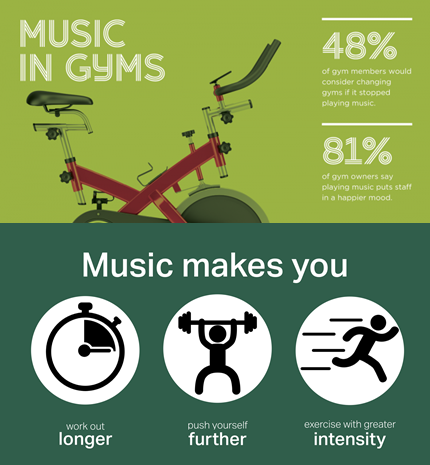The Soundtrack To Success
How Your Gym Playlist Affects Your Workout
If you take a wander round any gym on the planet, chances are that ~85% of people are plugged in to some headphones whilst they are working out. Each person has their very own Soundtrack to Success based on whatever floats their boat.
I myself have spent many years refining and re-refining multiple playlists that have helped me grind out that last rep on a strength session, or push through that final mile on a long-distance tempo run. From past experience, workouts without my beloved playlists result in a significant drop off in my performance.

Therefore, I did a bit more research on music and its effects on exercise to try and find out whether my personal mixtape of heavy Drum and Bass was, in actual fact, the key ingredient for a killer session…
After looking into it, it turns out what you listen to during exercise has a big effect on many different variables qffecting the quality of your session…
Set the Tone
We all have those days. When the weather is shit outside, the last thing you want to do is roll out of bed and hit the gym. This is where music can be of aid…
Entering the gym, or lacing up your trainers, with a negative mindset will set you up for a bad workout, which increases the risk of injury and demotivation. Getting plugged in to some feel-good music on your walk/drive to the gym will help get you in the right frame of mind to smash out a decent session.
Many studies have found the inner psychological effects of music pre-exercise, with certain genres/styles pertaining to an increase in arousal (I see you giggling….mature).
This is the physiological and psychological factors that prepare ourselves for physical exertion, such as a rise in heart rate, increased alertness, and improved attentional narrowing (focus).
If you want to go Science-y on your warm up playlist, studies suggest that the optimal speed of the beat should be between 120 and 126 bpm. For higher intensity workouts, warm up tunes should be 126-135 bpm.
Even before you start your warm up, music can play a big role in determining the quality of the following workout!
![]() Psych Up to Hit some PRs
Psych Up to Hit some PRs

You have no doubt seen that dude in the gym glaring at a loaded barbell in the squat rack, looking like he wants to violently murder someone. The same psyched-up gym-monkey will no doubt be adorned with a pair of Beats blaring out some filthy pump-up tunes…
Plugging in and zoning out into your own little world before a big lift focuses the attention on the task at hand by blocking out distractions that may reduce your performance. This allows you to optimise your training environment, creating your own personal Training Bubble, where you can chow down on a high quality, productive sessions.
This doesn’t’ just apply to your work in the weights room, either. A study conducted by the London Brunel University School of Sport and Education concluded that the act of listening to music can “reduce the perception of effort and increase endurance by as much as 15%”, therefore showing how the music you listen during cardio sessions affects the outcome in terms of productivity.
Furthermore, one cognitive scientist by the name of Tom Fritz conducted research in rural parts of Cameroon in Africa, where he spent time amongst a tribe of indigenous people called the Mafa. During his time with the Mafa, he noted how they were able to sustain physically exhausting rituals for hours on end whilst playing repetitive melodies on a Mafan wooden flute. Fritz concluded that “they achieve this through a sort of musical ecstasy” – a state of euphoria, almost, that allows them to maintain high levels of activity for prolonged bouts of time.
Jamming out and exercising work hand in hand even in the most primal of humans…
Keep the Pace
Other studies have shown the physiological results that occur when we listen to music during exercise . One particular study showed how up-tempo styles of music, such as Electronic Dance Music (EDM), stimulate the motor control and function area of the brain, improving our ability to move at a constant tempo or rhythm.
If your weight training programme requires you to stick to a given speed for certain exercises/movements, music can help you slow down or speed up accordingly. This form of training, known as Tempo Training, helps to develop coordination, stimulate muscle growth (hypertrophy), and increase energy expenditure during a workout; having the right playlist to hand will help you maintain these tempos in order to get the most out of a session.
In a nutshell, music can make or break an exercise session that requires rhythmic movement, including any form of running, dance, or other cardiovascular-based exercise.
Spotify is a great weapon to have in your arsenal when going out for a jog where you intend to keep to a given intensity throughout the workout. They have tailor-made playlists of varying genres that are set to a given tempo, or bpm (beats per minute). Lower intensity runs tend to be around 125-145bpm, while tempo runs, speed intervals and faster workouts tend to be more 160-190bpm.

Music can become your very own pacemaker, which may be the key to a periodised workout programme.
Bringing it Back to Reality
Cooling down: something we all should do that often gets pied off at the end of a workout due to time constraints. It is so important to allow your body to slowly return to its pre-exercise state following a heavy session, and what you listen to may have a huge impact on how effective your cooldown is…
One of the main aims of a cooldown is to allow the heart rate to return to resting levels. Some studies have shown that listening to music less than 100bpm post-exercise proved to accelerate this process, reducing the stress placed on the cardiovascular system following a big workout.

Even more interesting is one study undertaken by Bacharach and Szmedra that identified a link between classical music and reduced levels of chemical by-products of physical exertion. Their study proved that listening to relaxing music can help reduce acidosis and elevated levels of hormones that contribute to fatigue. In this way, the music we listen to after exercise has the potential to improve performance and recovery from a physiological perspective.
The Negatives?
The link between music and exercise isn’t all sunshine and roses, though. If you are starting out with resistance training and weights-based exercise, it might be better to leave the tunes out of the equation to facilitate attentional narrowing and complete focus on the task at hand.
For the most part, though, plugging in to your favourite workout playlist is going to do more good than harm!
The Final Word
You may not have realised before reading this article how much of a profound effect music has on the quality and intensity of your workout. Before doing the research, I never contemplated creating different playlists for different workouts; I simply plugged in to a random selection and cracked out a session.
Yet designing quality playlists tailored to your workout can help elevate your performance to the next level, serving to improve motor coordination, increase motivation and reduce the level of perceived fatigue. Thankfully, the good people of Spotify have done all the work for you ; simply go to the Workout section, and you have a whole range of playlists geared towards specific types of exercise routine.
So plug yourself in, smash your favourite tunes on, and go hit a big ol’ session.
SOURCES
https://www.acefitness.org/education-and-resources/lifestyle/blog/5763/music-and-exercise-how-music-affects-exercise-motivation
https://www.acefitness.org/certifiednewsarticle/805/ace-sponsored-research-exploring-the-effects-of
https://www.nationalgeographic.com/science/phenomena/2013/10/15/why-does-music-help-us-exercise/
